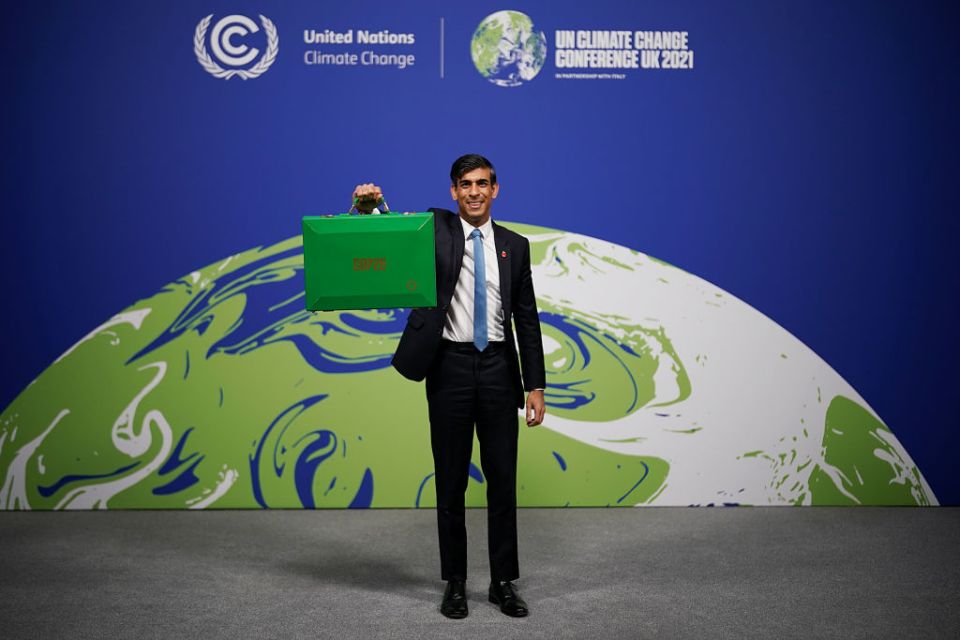Don’t let the eco-sceptics bend Sunak’s ear against green investment

Months later, Rishi Sunak is yet to set out a plan to compete with the billions Joe Biden has offered climate-friendly firms in the UK, writes Cameron Smith
Rishi Sunak made a mistake by omitting the environment from his five priorities, which he hopes to deliver to earn voters’ trust. The exclusion has let green issues fall off the government’s agenda when the race to decarbonise is speeding up.
Competition to win green investment is tougher than ever. The US is spending $370 billion to lure renewable energy and clean industry investors across the pond, while the EU has set out a $270 billion green deal to stay competitive. The UK, in comparison, still hasn’t set out a new offer.
Meanwhile, recorded ocean temperatures have never been higher. And the earth saw its hottest days on record for four days this July. It’s a powerful reminder – as the UN warned earlier this year – that “humanity is on thin ice and that ice is melting fast”.
While many backbench Conservative parliamentarians remain vocal champions of climate action – over 140 sit in the Conservative Environment Network’s caucus – reaching net zero is less of a driving force on Whitehall.
The vacuum gives space to the small but loud group of conservatives convinced net zero will bankrupt the country and be an electoral disaster for the party. When Lord Goldsmith resigned from the government, saying the Prime Minister was “simply uninterested” in the environment, this group welcomed his stance.
Sunak needs to ignore these naysayers and outline his green vision. He’s no stranger to environmental action. As Chancellor, he planned to make London the world’s first net zero financial centre. But in No10, he has noticeably dialled down the climate rhetoric of his predecessors and hasn’t filled policy gaps like ending the onshore wind ban or insulating draughty homes.
It’s a bad time to put net zero on the back burner. The Climate Change Committee has warned that the UK is still off course to reach its 2050 target. And if you aren’t leading the transition, you are falling behind, losing the jobs, industry and investment it could bring to our shores.
Without action, the UK could wind up into the worst of all climate responses: cutting its emissions but not fast enough to stop climate change and doing so by importing clean technologies from others instead of developing our own.
It should be a top agenda item for the government. We could lead the way; we are the fastest decarbonising country in the G7, the first to legislate for net zero, and have built the world’s largest wind farms off our coasts.
But instead of building on these achievements, we are letting other countries catch up. The government isn’t doing enough to secure new investment in the renewable energy supply chain and seems more focused on new oil and gas. It’s a surprising move as voters overwhelmingly – and rightly – blame them for high energy prices.
Fossil fuels are why inflation is sky-high, public debt is up, and economic growth is down – three things the Prime Minister wants to fix. Last winter, the government spent over £40bn helping families and businesses pay their energy bills. In contrast, Britain’s wind farms saved the nation £16bn in gas imports.
The next election will be won or lost on the cost of living issues. But the Prime Minister will need green solutions to solve the cause: our reliance on oil and gas. And while rising household bills dominate voters’ concerns, the environment remains a top-five issue for the public; they still expect action.
Net zero is fundamentally a conservative mission to conserve our planet and grasp economic opportunities. There’s still time for Sunak to lead it like his predecessors. The Conservatives have an impressive green record, but unless he talks about it and builds on it, he’ll struggle to attract new investment and win people’s votes.
